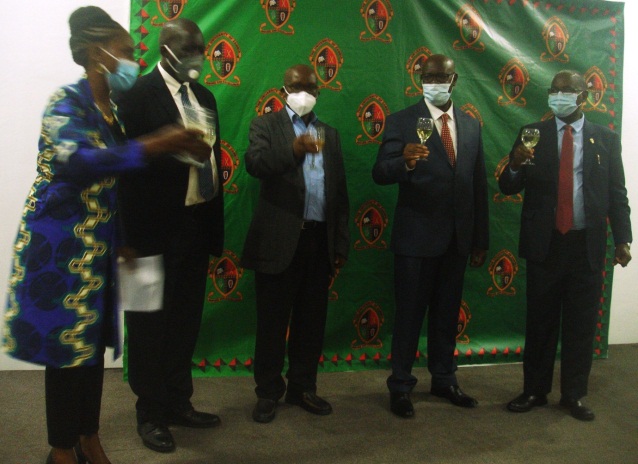Prof Lackson Kasonka launches 𝗨𝗡𝗭𝗔’s SHEPIZ
Notice: Undefined index: catFilterList in /home/zambi/public_html/wp-content/plugins/wp-likes/api.php on line 243
…as Zambia grapples with one Doctor for 12, 000 patients

Prof Lackson Kasonka launches 𝗨𝗡𝗭𝗔 SHEPIZ
By Derrick Sinjela and Bilke Mulenga
Ministry of Health (MoH) Permanent Secretary for Technical Services, Professor Lackson Kasonka launched University of Zambia (UNZA) Strengthening Health Professional Workforce Education Programmes for Improved Quality Healthcare in Zambia (SHEPIZ), with delight as Vice Chancellor Professor Luke Evuta Mumba pledging the Great East Road Campus remaining a centre of learning excellence.
Speaking within earshot of Prof. Mumba, SHEPIZ Principal Investigator Prof Fastone Mathew Goma at Lusaka’s Mulungushi International Conference Centre (MICC) on Wednesday 5th January, 2021, Prof. Kasonka applauded UNZA on the SHEPIZ programme involving 18 newly developed specialised medical and nursing programmes under the University’s school of Medicine and School of Nursing Sciences.
Prof. Kasonka says the SHEPIZ Post – Master of Medicine and Masters in Nursing programmes will contribute toward narrowing the one doctor to 12, 000 patient ratio in Zambia, which is at variance with recommended World Health Organisation (WHO) standard of one physician per 1,000 population.
“Government supports such initiatives as they foster development of medical specialists and leverage local resources,” noted Prof. Kasonka.
MoH statistics show shortage of Doctors, Nurses and Midwives at 14, 960, but with projected population growth, the deficits will double to 25, 849 by 2020 and 46, 000 by 2035.
“To enable the health sector attain the milestone of curbing the shortage of human resource for health capital development, one strategy is for public and private higher learning institutions to contribute to helping government realize the recommended goals. In line with the Zambia Vision 2030 and National Health Strategic Plan 2017-2021 of having a nation of healthy people and mission of providing equitable access to quality, safe, and cost-effective medical facility for all, attainment of such a vision requires a robust health care workforce to deliver the service,” experts prod.
UNZA Vice Chancellor Mumba explained that the September 2019- August 2024 five-year SHEPIZ programme was developed with National Health Institute (NHI) of the United States of America (USA).
“The project has four aims, health systems research strengthening, clinical skills development, inter-professional education and institution capacity building,” said Prof. Mumba.
UNZA Schools of Medicine and Nursing Sciences, through the SHEPIZ, held a third phase of an Implementation Science Short Course training workshop with support from the Centre of Infectious Disease Research in Zambia (CIDRIZ) from 2nd to 3rd December 2021 at Waterfalls Hotel in Chongwe district of Lusaka Province.
SHEPIZ Programme Manager, Dr Patricia Katowa-Mukwato, ‘Dean Two’ of School of Nursing Sciences at UNZA pegged focus of implementation science on investigating and promoting uptake of scientific interventions or research findings to solve real life problem situations in communities.
“SHEPIZ is working towards bridging this gap through training of individuals who will be able to implement research findings to influence policy making and solve community problems said Katowa-Mukwato.
Academic members of staff were selected from the Ridgeway-based schools for training in Implementation Science as trainers of trainers tasked to impart acquired skills to medical students.
After the training, the participants would select a pilot project whose research findings would be implemented in their respective schools at UNZA Ridgeway campus.
The focus School of Medicine – Barriers and Facilitators to the Implementation of Guidelines on Pain Relief during Manual Vacuum Aspiration at the Women and New Born Hospital, the School of Public Health – on Improvement and Support for Grant Writing Skills among Faculty at the four Ridgeway-based Schools, the School of Nursing Sciences – Strategies for Improving Performance of Students during Objective Structured Clinic Examinations at UNZA School of Nursing Sciences and the School of Health Sciences – to emphasis Feasibility of Using Tele-health to Provide Continued Post-discharge Care for Stroke Patients during the COVID-19 pandemic.
Objectives of the training workshops facilitated by CIDRIZ were to provide an overview of the principles, terms and concepts of evidence-based clinical interventions and implementation research and their applications, raise awareness about the need to generate relevant evidence in clinical practice, establish a basic understanding of approaches to addressing the gap between evidence and clinical practice, provide knowledge on common methods, study designs, frameworks, theories, strategies, and outcomes for implementation research and to impart skills in communication, stakeholder engagement and strategies for dissemination of evidence-based clinical practices and implementation research findings.



















